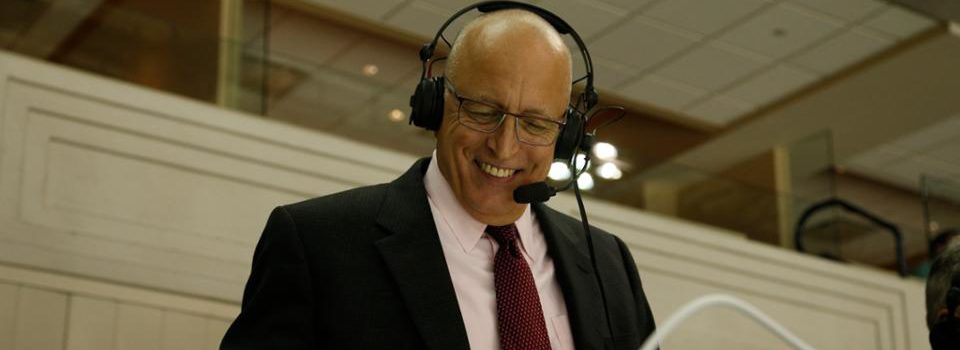Editor’s note: Wrong Side of the Red Line posts an in-depth feature each week (typically on Mondays, this week on a Tuesday) for Patreon supporters. Interested in subscribing? Follow this link, or click the “subscribe here” on the menu above. Those who have already subscribed can login and continue reading.
Roughly 38 years ago Dave Strader saw his first live hockey game.
It was the 1978 Great Lakes Invitational at Joe Louis Arena — an annual college hockey tournament held in downtown Detroit.
Strader, who was set to work in public relations with the Adirondack Red Wings when they made their American Hockey League debut for the 1979-80 season, was amongst a group of staffers from the minor-league team that made the trip to Detroit.
“Before the season and Adirondack joined the league they wanted us to come out to meet the Red Wings brass,” Strader said back in February. “It was around Christmas time and we went to see the Great Lakes Invitational. That was the first time I saw a live hockey game.”
A little under four decades later Strader is headed into the Hockey Hall of Fame and it was announced on Monday that Strader is the 2017 recipient of the Foster Hewitt Memorial Award, given annually for outstanding contributions as a hockey broadcaster.
It’s a fitting tribute for a broadcaster that’s inspired people on and off the ice this season. Set to enter his second full season as the Stars broadcaster, “The Voice” had his plans sidetracked after getting diagnosed on June 3, 2016 with cholangiocarcinoma, a rare and aggressive form of cancer that attacks the bile duct.
For most of the season he was forced to watch Stars games from afar back in Glens Falls, New York and it was the first time since the 1979-80 hockey season he wasn’t calling games on a nightly basis. He was able to return to Dallas and call five games during a lengthy home stand — including an emotional return to the American Airlines Center where the Stars won in overtime on a goal by Jamie Benn — and is now calling playoff games for NBC Sports between treatments.
When Benn addressed the crowd with a microphone after the Stars season finale the first name he mentioned was Dave Strader. And throughout his battle Strader has seen an outpouring of support from the hockey community in the form of emails, letters, and symbolic pins with his initials that broadcasters across the league have proudly worn.
Strader always had the voice for broadcasting. In fact, his son Trevor Strader says that his smooth delivery could have translated to a music career if he wanted it.
“I don’t know about that,” Strader said. “But there was a classical rock and roll band in our area that I knew the leader of the band for many years. If I showed up and they were playing, he’d have me come up sing a couple Beatles song.”
While the Beatles were his group of choice, basketball was his game.
Strader played hoops throughout high school and college and he often had his radio turned to a game on the hardwood.
“Broadcasting was something I thought about as kid, and I wasn’t a hockey person. I didn’t watch hockey, I didn’t know hockey, I never played hockey as a kid. I was a basketball guy,” Strader said. “When I was younger I’d go to bed with my little transistor radio and I’d listen to Marv Albert calling the Knicks. I’d listen to Andy Musser calling the 76ers. And I’d listen to Johnny Most calling the Celtics.”
And the plan was always to pursue a career in basketball. After finishing college at the University of Massachusetts he and his wife moved to Southern California for a job opportunity.
“We got home sick very quick there in Southern California and they were just breaking ground on a new arena back home in Glens Falls,” Strader said. “So at this point, still having not seen hockey live, I started nosing around for a job. I got hired as an assistant to the (public relations) director and we did a bit of everything — we we’re trying to get a new franchise off the ground.”
A bit further into the summer Strader asked about the broadcast. Who would be calling the games? Did they have anyone in mind?
“I told them I’d like to audition for the play-by-play job,” Strader said. “So when they had training camp here (in Glens Fall) in ’79 I took my little tape recorder up to the booth and just tried to learn on the job. And I don’t even remember at that point if I had even listend to anybody call hockey.”
“So I had to learn some of the common vernacular,” Strader added. “So I did it for a few days and I had one stretch of calls that I thought was pretty good and they listened to it and said, ‘OK that’s great.’ That’s how I started in hockey.”
And he quickly found a passion that turned him into a fixture in the hockey community.
He worked his way up to Detroit and the NHL by 1985 and stayed there until 1996. Then, he stepped up to national jobs with ESPN, ABC and NBC. Strader also has had stops with the Florida Panthers and Arizona Coyotes before joining Dallas broadcast.
“I thought it was unbelievable,” Strader said. “That was the first time I’d seen hockey live and then a few months after that I was hired to the play-by-play. And after that I was immediately hooked. How involved you are in doing by play-by-play, you really have to paint the picture where the puck is. It’s something I loved doing right from the start.”

Leave a Reply
You must be logged in to post a comment.